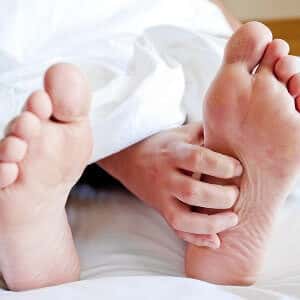
Peripheral neuropathy, pain in the feet and legs (or occasionally even in the hands and arms), can be challenging to treat. Ideally, of course, the physician would identify what was causing the nerves to misfire and cause pain and then treat the underlying condition. That is not always possible, however. Elevated blood sugar in diabetes begins damaging tiny blood vessels and nerves long before symptoms become apparent. Chemotherapy may cause nerve pain as a side effect of fighting off cancer. And sometimes, doctors can’t identify the root cause. They may prescribe medications to manage nerve pain, but many have drawbacks. Might acupuncture help relieve the pain of neuropathy?
Q. In one article, you offered suggestions for an alternative to gabapentin for the treatment of diabetic neuropathy. I suffer from neuropathy as a result of cancer treatments. Although I took gabapentin for ten years, it never really worked well for me. I had to keep increasing the dosage, but eventually I could no longer tolerate it.
My medical oncologist suggested acupuncture, and I found a skilled practitioner. Acupuncture has brought me amazing relief. The key is to find an acupuncturist who knows how to treat chronic pain.
Acupuncture for the Pain of Neuropathy:
A. A systematic review of acupuncture for treating chemotherapy-induced peripheral neuropathy concluded that this is an effective approach (Integrative Cancer Therapies, Jan-Dec. 2019). The scientists did make a plea for further study, and another systematic review also called for more research (Current Oncology, April 2019). These reviewers found insufficient evidence to determine if acupuncture is effective the pain of neuropathy caused by chemotherapy.
They offered this conclusion, however:
“Given that acupuncture is considered safe and might provide relief for patients, it can be considered at the clinician’s discretion.”
Another review looked more broadly at nondrug approaches for easing the pain of neuropathy (Current Treatment Options in Neurology, Sep. 2, 2019). The investigators endorsed diet and exercise, but added that clinicians might also recommend acupuncture and yoga or supplements such as vitamin B12, alpha lipoic acid and acetyl-L-carnitine. Patients deficient in vitamin D benefit from supplements to overcome the deficiency.
Citations
- Chien TJ et al, "The Efficacy of acupuncture in chemotherapy-induced peripheral neuropathy: Systematic review and meta-analysis." Integrative Cancer Therapies, Jan-Dec. 2019. DOI: 10.1177/1534735419886662
- Li K et al, "A systematic review of acupuncture for chemotherapy-induced peripheral neuropathy." Current Oncology, April 2019. DOI: 10.3747/co.26.4261

